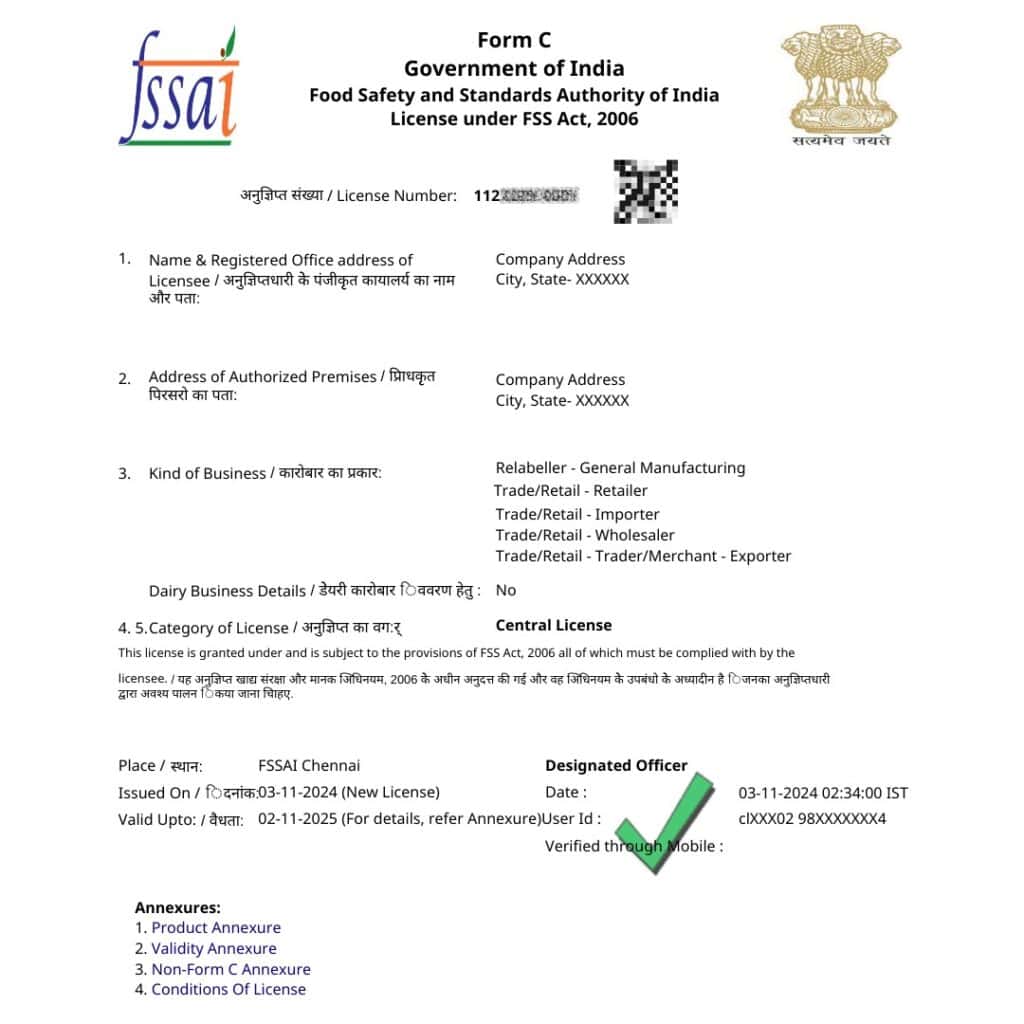A guide for all food businesses in India on FSSAI licensing process and its role in ensuring food safety. Food Safety and Standards Authority of India, commonly abbreviated as FSSAI, is the regulator for food businesses. An FSSAI license builds consumer trust and ensures food safety compliance for any food business. This ensures business operations meet the highest standards of food safety. Negligence in obtaining a proper FSSAI license will be exposed to maximum risk such as high penalties and loss of reputation for the food businesses. In this blog, we have discussed the process of FSSAI licensing, risk of non-compliance and its significance in the food business.

What is FSSAI and Why is Licensing Important (3)
Food Safety and Standards Authority of India (FSSAI) is a statutory body constituted under the Ministry of Health & Family Welfare, Government of India. Primarily, it focuses on setting standards and enforcing them through inspections and testing against the safety standards to meet quality of food for consumption. A license signifies that the business is aware of the requirements and norms of food safety and standards. With increasing consumer awareness on quality and safety of food, a legitimate FSSAI license is an absolute must.
Who falls under FSSAI Licensing?
Who falls under FSSAI Licensing?
As a starter, any business which is associated with food, whether it is manufacturer, caterer, re-packing unit, transporter, canteens, temples, street food vendors, everyone needs to have some kind of a registration with the FSSAI.
FSSAI Categories
There are various kinds of categories under the FSSAI license provided to the food businesses according to their size and the nature of business. These categories are as follows:
Basic FSSAI Registration: This is generally issued for small food business units, a small-scale retailer in foodstuffs, or a home-based food business unit. It is issued for an annual turnover that does not cross ₹12 lakhs.
State FSSAI License: Food business operators (FBOs)require a state FSSAI license if their annual turnover falls between the range of: ₹ 12 lakhs to ₹ 20 crores.
Central FSSAI License: For food businesses who have a yearly turnover of ₹20 crores and above need to obtain the central FSSAI license. Even those entities that are conducting import or export business in connection with food commodities need such a license. Apart from the turnover, there could be some additional criteria that determine whether your food business requires a central license. For instance, a central license would be mandatory if FBOs operate company owned e-commerce platforms or are involved in manufacturing of nutraceutical or proprietary products.

Procedure to get an FSSAI License (1)

The process of obtaining an FSSAI license includes several steps. The first thing, however, depends on the size of the food business concerned and varies from case to case but here’s a general overview:
Determine the Type of License Required: As mentioned above, businesses need to determine whether they require a Basic Registration, State License or Central License based upon their annual turnover and type of operation.
Application Filing: All FSSAI licenses have to be submitted online through the official FoSCoS – FSSAI website. The application form asks for information regarding the nature of the business, the manufacturing process, the address of the premises and the types of food products being manufactured.
These are some of the documents that need to be submitted by the food business to the FSSAI licensing authority. Some state and central licenses may require further documentation as additional requirements.
For example, some may require food safety management plans, food safety audits and many more.
Inspection of Premises: According to the category of license and the magnitude of business, FSSAI may inspect the FBO’s premises. This ensures that the food business establishments are compliant with the safety, hygiene and sanitation standards as per the FSSAI schedule IV guidelines.
Issue and License Approval: After the application’s review and the subsequent inspection(wherever applicable), FSSAI issues the license to the FBO. The issued license is valid for a period of 1-5 years and is liable for renewal.
Compliance and Renewal: Food businesses should ensure that all the regulations and guidelines by FSSAI continue to be in compliance with their license throughout the validity period. Renewal of FSSAI license should be filed before the validity period ends to avoid incurring fines.
Importance of FSSAI Licensing to Food Businesses (2)
Legal Compliance: Food businesses operating without a valid license from FSSAI will incur penalties and fines or could even lead to suspension of the business. FSSAI compliance guidelines ensure that food businesses follow the laws and regulations set without running into legal issues.
Consumer Safety: Another important reason for FSSAI licensing is the safety of consumer health and well-being. A licensed manufacturer would have to abide by the guidelines of food safety, meaning products would not contain harmful substances, contaminants or allergens.
Credibility and Trust: This FSSAI license gives credibility in the market. Consumers are likely to trust the products that have the FSSAI logo on their product because they can trust the quality and safety of food being consumed.
Market Access: An FSSAI license is a proof of compliance with credible food safety standards, and it can be used by food businesses who want to expand their market reach, especially in international markets. It is important for businesses engaged in the export and import of food products.
A food safety management system, controlling hygiene and quality of food, should be established during the licensing process. It aids in checking through regular audits and ensures improvement to attain better standards for the food operators.
Conclusion
FSSAI licensing is one of the critical factors for operating a food business in India. It is both a regulatory requirement and a tool for ensuring food safety and quality. FBO’s with FSSAI licenses are well positioned to win the trust, meet legal standards and benefit from an ever-growing market, increasingly health-conscious and safety-oriented consumers.
Understanding the process and importance of FSSAI licensing will help food businesses position themselves for success, making their way to a safer, more reliable food supply for consumers both in India and worldwide.
Why Food Safety Works?
Food Safety Works is your trusted partner in getting your FSSAI license. We know how the licensing process can be complex and we are committed to making it as smooth, cost-effective and stress-free as possible. We provide regulatory and compliance solutions and take care of everything from the submission of your application to getting the final license so that you can focus on growing your business without any distractions.
Being an organization with over 15 years of experience and thorough knowledge of FSSAI regulations, we provide end-to-end support for full compliance in the licensing process. To keep track of all your FSSAI compliances in a single place you can use our myFssai platform.
Research Articles Referenced:
- Food Safety and Standards Authority of India, Guidelines for Registration & Licensing.
- Agarwal, A., & Gupta, P. (2022). “The Role of FSSAI in Ensuring Food Safety and Quality.” International Journal of Food Science and Technology.
- Mehta, S. & Singh, N. (2021). “FSSAI and Its Impact on Food Manufacturers. Journal of Food Policy and Regulation.